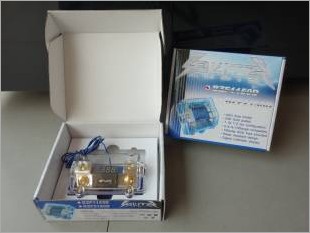Ad information
The VXi amplifier ecosystem is designed to be very flexible, offering users almost limitless combinations of amplifiers and channel architectures, along with the amazing power of its integrated DSP technology. VXi-HUB is an accessory designed to simplify the control of a networked amplifier system, while greatly easing the setup process, by allowing all amplifiers to appear in a single TüN software session.
VXi-HUB performs two distinct functions as part of a system employing two or more VXi amplifiers: data networking and digital audio distribution.
Data networking is the primary function of the VXi-HUB, permitting a network of VXi amplifiers to respond to synchronized commands from a single DRC controller (DRC-100, DRC-200 or DRC-205, all sold separately). These commands can include Master Volume, Subwoofer Level, Fader, Zone Level and Preset Selection.
The VXi-HUB also enables the networked VXi amplifiers to be tuned from within a single TUN software session, allowing the user to quickly switch between amplifiers during the tuning process, without disconnecting and connecting multiple cables.
For data networking purposes, the VXi-HUB is equipped with one Master and five Slave JLid-COMM connections, permitting the networking of up to six VXi amplifiers using standard CAT5e cables (one master amplifier and five slave amplifiers). For more complex systems, two VXI-HUBs can be daisy-chained to create a network of up to ten VXi amplifiers (one master amplifier and nine slave amplifiers).
VXi-HUB also includes a dedicated JLid-COMM accessory port to allow the connection of the optional VXi-BTC Bluetooth Communicator (sold separately). This accessory enables convenient wireless setup and tuning of the entire amplifier network using a compatible iOS or Android device with TUN Mobile or TUN Express apps.
The secondary function of the VXi-HUB is to distribute synchronous optical digital audio signals to the networked amplifiers, avoiding the delays associated with handing digital signals off through a chain of amplifiers. The optical digital audio output of a source unit connects directly to the VXi-HUB's Optical Audio Input, which then distributes synchronous digital audio to the amplifiers from its five Optical Outputs. VXi-HUB handles S/PDIF signals up to 24 bits/192 kHz.
For ease of connection, the VXi-HUB is powered via the JLid connection to VXI amplifiers and requires no separate power or turn-on wiring.
VXi-HUB includes the following features:
- JLid-COMM Connections: 1 Master Input / 5 Slave Outputs / 1 Accessory Port
- Optical Audio (S/PDIF) Connections: 1 Input / 5 Synchronous Outputs
- 3-Way Configuration Switch: Standalone / Primary / Secondary
- Amp Identifier Status LEDs
- Powered via JLid connection to VXi amplifiers
Facebook URL: https://www.facebook.com/SingTrade-Marketing-Services-1482040458683011/

Ad information
The VXi amplifier ecosystem is designed to be very flexible, offering users almost limitless combinations of amplifiers and channel architectures, along with the amazing power of its integrated DSP technology. VXi-HUB is an accessory designed to simplify the control of a networked amplifier system, while greatly easing the setup process, by allowing all amplifiers to appear in a single TüN software session.
VXi-HUB performs two distinct functions as part of a system employing two or more VXi amplifiers: data networking and digital audio distribution.
Data networking is the primary function of the VXi-HUB, permitting a network of VXi amplifiers to respond to synchronized commands from a single DRC controller (DRC-100, DRC-200 or DRC-205, all sold separately). These commands can include Master Volume, Subwoofer Level, Fader, Zone Level and Preset Selection.
The VXi-HUB also enables the networked VXi amplifiers to be tuned from within a single TUN software session, allowing the user to quickly switch between amplifiers during the tuning process, without disconnecting and connecting multiple cables.
For data networking purposes, the VXi-HUB is equipped with one Master and five Slave JLid-COMM connections, permitting the networking of up to six VXi amplifiers using standard CAT5e cables (one master amplifier and five slave amplifiers). For more complex systems, two VXI-HUBs can be daisy-chained to create a network of up to ten VXi amplifiers (one master amplifier and nine slave amplifiers).
VXi-HUB also includes a dedicated JLid-COMM accessory port to allow the connection of the optional VXi-BTC Bluetooth Communicator (sold separately). This accessory enables convenient wireless setup and tuning of the entire amplifier network using a compatible iOS or Android device with TUN Mobile or TUN Express apps.
The secondary function of the VXi-HUB is to distribute synchronous optical digital audio signals to the networked amplifiers, avoiding the delays associated with handing digital signals off through a chain of amplifiers. The optical digital audio output of a source unit connects directly to the VXi-HUB's Optical Audio Input, which then distributes synchronous digital audio to the amplifiers from its five Optical Outputs. VXi-HUB handles S/PDIF signals up to 24 bits/192 kHz.
For ease of connection, the VXi-HUB is powered via the JLid connection to VXI amplifiers and requires no separate power or turn-on wiring.
VXi-HUB includes the following features:
- JLid-COMM Connections: 1 Master Input / 5 Slave Outputs / 1 Accessory Port
- Optical Audio (S/PDIF) Connections: 1 Input / 5 Synchronous Outputs
- 3-Way Configuration Switch: Standalone / Primary / Secondary
- Amp Identifier Status LEDs
- Powered via JLid connection to VXi amplifiers
Merchant information
More items from this seller
Email Enquiry
* indicates compulsory field.




































